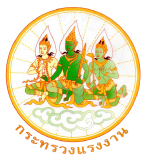Deputy Permanent Secretary of Labour Mr. Singhadet Chu-umnart commenced the seminar on “Export Markets and Social Compliance”, saying that Labour Minister General Sirichai Distakul has given great importance to the prevention and elimination of child labour, slavery and human trafficking. However, he said that as it remains necessary for the Thai export industry to employ migrant workers to drive the business and national economy forward, there must be measures to ensure a balance of true demand and supply of migrant labour to ensure effective migration. This is the reason behind the creation of regulations and emphasis for collaboration from all parties, in order to create safe, transparent and ethical employment processes for migrant workers.
Over the past decade, Thailand has increasingly required migrant workers to fulfil labour demands. Part of the reason is because the Thai working population is getting smaller, coupled with an increase in the aging population, resulting in a labour shortage and necessity to fill the gaps with migrant workers to ensure consistent economic growth and social development. Thailand currently houses 3 million migrant workers with a trend for this number to grow, particularly in the seafood processing and fishing industry which is a crucial economic foundation for Thailand. The nation has made many efforts to improve migrant worker management, to which the Ministry of Labour is a major part of the efforts in pushing for fair employment, with the most recent enactment of the Royal Decree on Recruitment of Foreigners BE 2559. The decree outlines that employers are responsible for any recruitment-related fees for foreigners, aiming to control recruitment businesses and agencies importing foreign workers. The Ministry of Labour has also increased the number of inspectors and interpreters, as well as channels for migrant workers to access assistance, information and advice. The ministry has given great focus to anti-human trafficking and protection of foreign workers, particularly giving attention to businesses at risk of child labour, slavery, debt bondage and human trafficking, whereby promoting good labour practices and amending relevant legislation and regulations. These have included the Ministerial Regulation Concerning Labour Protection in Agricultural Work B.E.2557 and the Ministerial Regulation to Protect Labour in the Sea Fishing Industry. B.E. 2557, which require children to be 18 and over to be eligible for employment. The regulations have already been enforced with serious penalties impost on violators.
Mr. Singhadet said that the Ministry of Labour is focused on ensuring integration of work by all units, preventing human trafficking, child labour and slavery through inspections and control of businesses to comply with good labour practices. He said that establishing an understanding of regulations and social compliance is a crucial part of effective labour migration both sending and receiving countries, including the worker themselves and employers, which will help ensure that such recruitment is transparent, safe and up to international standards.
####################
Bureau of Public Relations




